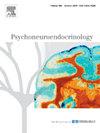Dynamic interplay of cortisol and BDNF in males under acute and chronic psychosocial stress – A randomized controlled study
IF 3.4
2区 医学
Q2 ENDOCRINOLOGY & METABOLISM
引用次数: 0
Abstract
The neurotrophic protein brain-derived neurotrophic factor (BDNF) plays a pivotal role in brain function and is affected by acute and chronic stress. We here investigate the patterns of BDNF and cortisol stress reactivity and recovery under the standardized stress protocol of the TSST and the effect of perceived chronic stress on the basal BDNF levels in healthy young men. Twenty-nine lean young men underwent the Trier Social Stress Test (TSST) and a resting condition. Serum BDNF and cortisol were measured before and repeatedly after both conditions. The perception of chronic stress was assessed by the Trier Inventory for Chronic Stress (TICS). After the TSST, there was a significant increase over time for BDNF and cortisol. Stronger increase in cortisol in response to stress was linked to an accelerated BDNF decline after stress. Basal resting levels of BDNF was significantly predicted by chronic stress perception. The increased BDNF level following psychosocial stress suggest a stress-induced neuroprotective mechanism. The presumed interplay between BDNF and the HPA-axis indicates an antagonistic relationship of cortisol on BDNF recovery post-stress. Chronically elevated high cortisol levels, as present in chronic stress, could thereby contribute to reduced neurogenesis, and an increased risk of neurodegenerative conditions in persons suffering from chronic stress.
男性在急性和慢性社会心理压力下皮质醇和 BDNF 的动态相互作用 - 一项随机对照研究
神经营养蛋白脑源性神经营养因子(BDNF)在大脑功能中起着关键作用,并受到急性和慢性压力的影响。我们在此研究了健康年轻男性在TSST标准化压力方案下的BDNF和皮质醇压力反应性和恢复模式,以及感知到的慢性压力对基础BDNF水平的影响。29 名体型偏瘦的年轻男性接受了特里尔社会压力测试(TSST)和静息状态测试。在这两种情况之前和之后反复测量血清 BDNF 和皮质醇。对慢性压力的感知通过特里尔慢性压力量表(TICS)进行评估。TSST后,BDNF和皮质醇随时间显著增加。皮质醇在压力下的强烈升高与 BDNF 在压力后的加速下降有关。BDNF的基础静息水平在很大程度上受慢性压力感知的影响。心理社会压力后 BDNF 水平的升高表明压力诱导的神经保护机制。BDNF与HPA轴之间的相互作用表明,皮质醇对应激后BDNF的恢复具有拮抗作用。慢性应激中皮质醇水平的长期升高可能会导致神经发生减少,并增加慢性应激患者罹患神经退行性疾病的风险。
本文章由计算机程序翻译,如有差异,请以英文原文为准。
求助全文
约1分钟内获得全文
求助全文
来源期刊

Psychoneuroendocrinology
医学-精神病学
CiteScore
7.40
自引率
8.10%
发文量
268
审稿时长
66 days
期刊介绍:
Psychoneuroendocrinology publishes papers dealing with the interrelated disciplines of psychology, neurobiology, endocrinology, immunology, neurology, and psychiatry, with an emphasis on multidisciplinary studies aiming at integrating these disciplines in terms of either basic research or clinical implications. One of the main goals is to understand how a variety of psychobiological factors interact in the expression of the stress response as it relates to the development and/or maintenance of neuropsychiatric illnesses.
 求助内容:
求助内容: 应助结果提醒方式:
应助结果提醒方式:


